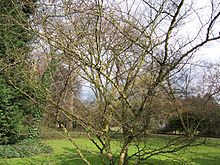Zanthoxylum simulans
| Zanthoxylum simulans | |
|---|---|

| |
| Habitus of leafless plant | |
| Scientific classification | |
| Kingdom: | Plantae |
| Clade: | Tracheophytes |
| Clade: | Angiosperms |
| Clade: | Eudicots |
| Clade: | Rosids |
| Order: | Sapindales |
| Family: | Rutaceae |
| Genus: | Zanthoxylum |
| Species: | Z. simulans
|
| Binomial name | |
| Zanthoxylum simulans | |
| Subspecies[1] | |
| |
| Synonyms | |
| |
Zanthoxylum simulans, the Chinese-pepper,[2] Chinese prickly-ash or flatspine prickly-ash, is a flowering plant in the family Rutaceae, native to southern and central China, Taiwan, and South Korea.[1] It is one of several species of Zanthoxylum from which Sichuan pepper is produced.
It is a spreading shrub or small tree growing to 7 m tall. The leaves are 7–12.5 cm long, pinnate, with 7–11 leaflets, the leaflets 3–5 cm long and 1.5–2 cm broad. There are numerous short (3–6 mm) spines on both the stems and the leaf petioles, and large (several cm) knobs on the branches. The flowers are produced in slender cymes, each flower about 4–5 mm diameter. The 3–4 mm berry has a rough reddish brown shell that splits open to release the black seeds from inside.

Subspecies
[edit]Two subspecies are accepted.[1]
- Zanthoxylum simulans subsp. calcareum Z.H.Chen, Feng Chen & W.Zhu – Zhejiang
- Zanthoxylum simulans subsp. simulans – central and southern China, South Korea, and Taiwan
Aromatic composition
[edit]Notes and references
[edit]- ^ a b c "Zanthoxylum simulans Hance". Plants of the World Online. Royal Botanic Gardens, Kew. Retrieved 24 October 2024.
- ^ NRCS. "Zanthoxylum simulans". PLANTS Database. United States Department of Agriculture (USDA). Retrieved 9 August 2015.
- ^ Chyau, Charng-Cherng; Mau, Jeng-Leun; Wu, Chung-May (1996). "Characteristics of the Steam-Distilled Oil and Carbon Dioxide Extract of Zanthoxylum simulans Fruits". Journal of Agricultural and Food Chemistry. 44 (4): 1096–1099. doi:10.1021/jf950577d.
- ^ Lenz, Clarissa; Melzig, Matthias F. (2018). "Sichuan-Pfeffer Zanthoxylum simulans Hance". Zeitschrift für Phytotherapie (in German). 39 (2): 93–99. doi:10.1055/s-0044-100888. ISSN 0722-348X.
- Flora of Taiwan, volume 3 pages 541, 542 and 543
- NC State University fact sheet
